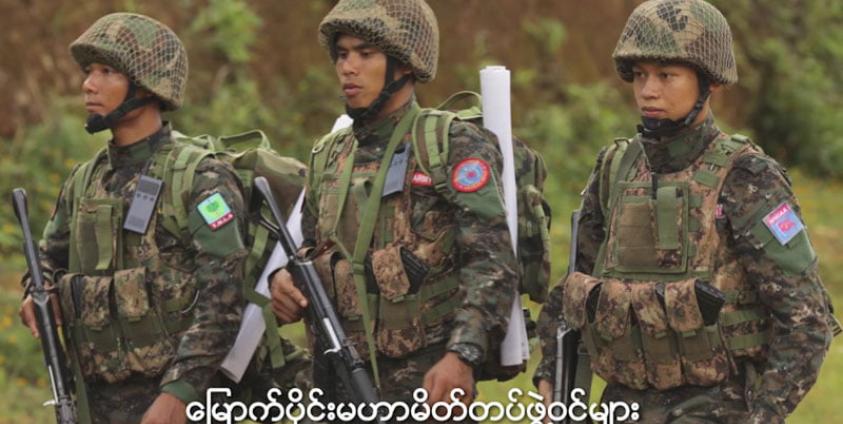Aung Htein — The Three Brotherhood Alliance on January 1 announced the extension of a unilateral ceasefire through February to facilitate practical steps in the peace process with Myanmar’s military and government, and as a gesture toward building mutual understanding among stakeholders.
The alliance, a military coalition consisting of the Myanmar National Democratic Alliance Army (MNDAA), Ta’ang National Liberation Army (TNLA) and Arakan Army (AA), said their collective forces will hold their fire for the next 59 days, until February 28.
The Lower House lawmaker representing Arakan State’s Kyauktaw Township, U Oo Tun Win, said political dialogue will produce positive outcomes for the peace process.
“The AA has expressed its political will by declaring a ceasefire at this time. This is a good sign. If constructive talks can be held based on this foundation, there will be certain improvements [in the peace process],” he said.
The Three Brotherhood Alliance further said its unilateral ceasefire aims to help end Myanmar’s civil war and benefit ethnic people, as well as building border stability for Myanmar and its neighbours, and protecting the lives and property of civilians.
They said they also intend to contribute to COVID-19 prevention and control measures.
Myanmar’s military (or Tatmadaw) also declared unilateral ceasefire on December 31, effective until January 31, with the stated purpose of building a permanent peace in Myanmar, facilitating the peace process with ethnic armed organisations, and contributing to COVID-19 prevention, control and treatment efforts.
Arakan State and Chin State’s Paletwa Township remain effectively excluded from the Tatmadaw ceasefire because both it and the government have designated the AA a terrorist group.
Practical actions are more important than statements, said Lower House lawmaker U Pe Than, who represents Myebon Township in Arakan State.
“But we should welcome the practical actions. It appears that the Tatmadaw released the statements as usual because the government has declared the AA a terrorist organisation. However, we can see negotiations on the ground. So we think practical actions are more important than statements,” said the MP.
Tatmadaw and AA leaders have so far held three rounds of talks, with the most recent taking place online on December 30. The AA has said it released three National League for Democracy (NLD) candidates that it abducted prior to the November 8 general election, as well as three Tatmadaw soldiers, on January 1.
Due to the Tatmadaw-AA conflict, the number of internally displaced people (IDPs) in Arakan State topped 230,000 in October, according to the Rakhine Ethnics Congress (REC), before falling to below 200,000 as IDPs have returned to their homes in the absence of fighting over recent weeks.
IDPs are hoping the détente presages a more durable peace.
“We want peace so that we can return home. It is not good for us to live here. I want to work peacefully in my village,” said Daw Oo May, an IDP from Paletwa Township who is currently sheltering at Otthalin IDP camp in Sittwe.
The cessation of fighting in Arakan State — which had raged for nearly two years prior to the November election — has lasted more than a month, with political analysts saying talks between the leaders of both sides are having a positive effect on the peace process.








